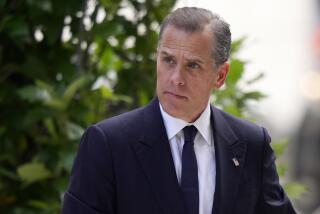Closing arguments in John Edwards trial
- Share via
GREENSBORO, N.C. — Both sides in the John Edwards trial gave detailed closing arguments Thursday to a federal jury that will decide whether the former presidential candidate knowingly violated campaign finance laws in a scheme to hide an extramarital affair.
Prosecutors told jurors that testimony and evidence in the nearly four-week trial prove that Edwards solicited and orchestrated secret payments of $925,000 from two wealthy benefactors to save his campaign for the 2008 Democratic nomination from scandal.
Edwards’ lead lawyer, Abbe Lowell, countered that the payments were private gifts intended to hide Edwards’ ongoing affair with videographer Rielle Hunter — and their baby — from Edwards’ wife, Elizabeth. Lowell said Edwards did not know about the money during his campaign, which was suspended in January 2008.
The jury received instructions from U.S. District Judge Catherine Eagles late Thursday and was expected to begin deliberations Friday morning.
The case against Edwards, once a rising Democratic political star who was Sen. John F. Kerry’s vice presidential running mate in 2004, has drawn national attention. Every seat in the courtroom has been filled most days, with long lines snaking through corridors as people wait for a chance to hear details of an illicit affair exposed in lurid National Enquirer exclusives.
The trial has focused on what Lowell called “salacious stories” about Edwards’ “bad marriage conduct.” But both sides stressed to the jury that it must decide not whether Edwards was a good husband or a practiced liar, but whether he broke the law.
Prosecutors accused the defense of distracting jurors from Edwards’ alleged crimes by savaging the reputation of their star witness, Edwards’ former aide Andrew Young. The defense accused Young, who appropriated at least half of the payments for himself and his wife, of perjury and witness-tampering.
Of the Youngs, Lowell said, “They could shame Bonnie and Clyde.”
“It’s Defense 101: Make the case about the government’s witness,” the lead prosecutor, David Harbach, told jurors in warning them not to “fall for the easy sell.”
Rather than the “criminal mastermind” depicted by Lowell, Harbach said, Young was a “fall guy” for Edwards. He said Edwards manipulated Young into handling the payments while Young hid Hunter from Elizabeth Edwards and the tabloid press. Edwards even convinced Young to falsely claim that he fathered the daughter born to Edwards and Hunter, Harbach said.
The money was supplied by billionaire heiress Rachel “Bunny” Mellon, now 101, and the late Fred Baron, a wealthy Texas lawyer.
Conceding that Young had lied often in the past, Harbach said Young’s testimony implicating Edwards was corroborated by other witnesses, telephone records and Edwards’ own words on voice mail messages. He cited “a mountain of interlocking, self-reinforcing evidence.”
Edwards, he said, lied repeatedly as part of a conspiracy to hide the money from federal election regulators. “He lies as little or as much as necessary,” Harbach said.
Edwards, who sat with head bowed during prosecutors’ statements, looked down and pursed his lips when prosecutor Robert Higdon told jurors that Edwards directed a conspiracy.
“The whole scheme was cooked up to support John Edwards’ political ambitions,” Higdon said.
For over two hours, Lowell sought to convince jurors that, although Edwards had made egregious mistakes that cost him his marriage and political career, he had committed no crime.
“This is a case that should define the difference between someone committing a wrong and committing a crime … the difference between a sin and a felony,” Lowell said.
Edwards, 58, faces up to 30 years in prison and $1.5 million in fines if convicted on all six counts.
Lowell accused prosecutors of overwhelming jurors with sordid testimony about Edwards’ affair in order to distract them from an absence of hard evidence that Edwards knew of the payments and knew they were illegal.
He said Young tried to blackmail Edwards with a video of a sexual encounter with Hunter, and lied to link Edwards to the payments.
“John’s conduct in this affair is shameful,” Lowell said, but “Andrew Young’s lies on the stand — and the government sponsoring those lies — is worse.”
Young testified under a grant of immunity.
Lowell reminded jurors that Edwards’ campaign was not required by the Federal Election Commission to report the payments as campaign contributions — even after Edwards was indicted. And, Lowell said, a former FEC chairman testified that no one in his 37 years of experience had ever been charged with a crime for using private third-party money to cover up an affair during a campaign.
Edwards sought to emerge from the scandal “with dignity intact” for himself and his family, Lowell said.
“It was not for the purpose of getting around the campaign laws, but to get around Mrs. Edwards,” Lowell said.
More to Read
Get the L.A. Times Politics newsletter
Deeply reported insights into legislation, politics and policy from Sacramento, Washington and beyond. In your inbox twice per week.
You may occasionally receive promotional content from the Los Angeles Times.











